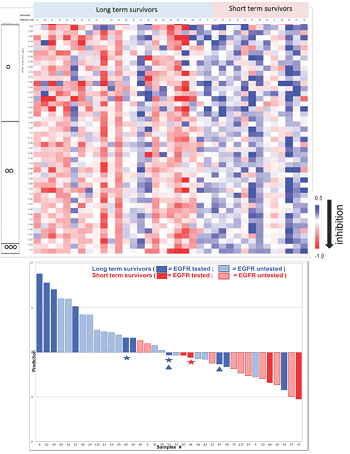Dr. Stephan Arni and researchers at the University of Zurich, Switzerland have shown how kinomic profiling can be used to discover prognostic biomarkers in lung cancer, that could potentially provide therapy guiding information prior to lung cancer patient therapy.

Tyrosine kinase (TK) activities and ex vivo gefitinib inhibition profiles of lung adenocarcinoma (LuAdCa) resection specimens were analyzed. In long-term survivors, they observed a larger TK inhibitor-induced decrease in tyrosine phosphorylation compared to short-term disease survivors (shown in the heatmap): 26 of 76 selected peptides were significantly more inhibited in the long-term survivors (p < 0.01, FDR < 3%). Using statistical class prediction analysis, they obtained a ‘prognostic-signature’ for long- versus short-term disease survivors and correctly predicted the survival status of 73% of the patients (shown in the waterfall plot).
Such a translational approach may assist clinical disease management after surgical resection and may help to direct patients for an optimal treatment strategy
Download the article to know more!
Download
Reference
Ex vivo multiplex profiling of protein tyrosine kinase activities in early stages of human lung adenocarcinoma
Arni S, Nhung Le TH, de Wijn R, Garcia-Villegas R, Dankers M, Weder W and Hillinger S (2017). Oncotarget Advanced publications
Contact one of PamGene’s scientists who worked with the Arni Group, to add further insights to the article! Rik de Wijn (rdwijn@pamgene.com)

